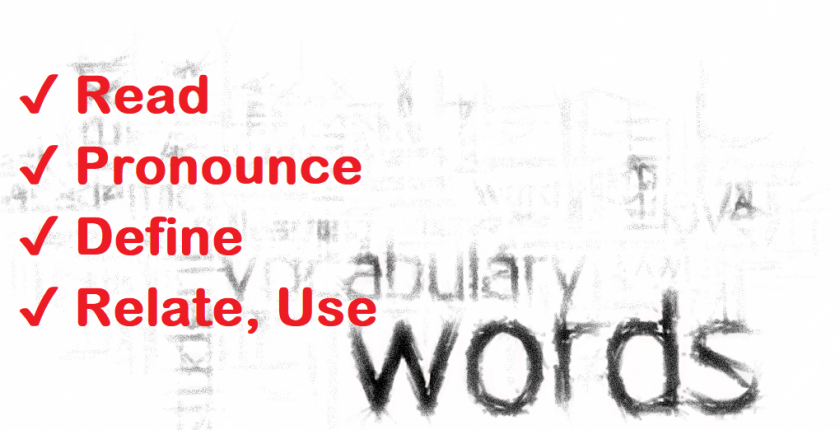
More than 50% of the GRE verbal section is directly linked to vocabulary – having a good vocabulary accounts for a considerable addition of points.
10 out of 20 questions on the verbal section require a strong vocabulary. Moreover, the Reading comprehension type Questions also require the test takers to have a good vocabulary for them to properly understand the text and answer the questions accordingly.
First of all, install Magoosh Flashcard app in your smartphone. It is the best vocabulary list out there followed by Barron’s 1100 word list.
Let’s start!
So humans retain or learn language through
A. Learning the Sound of it
B. Knowing the Visuals – looking at written words
C. Linking new words to existing memories – using the newly learned language.
D. Carving new memory slots in their brain by trying to memorize words
You miss one part and chances are you will forget the words you memorized.
The following steps should be followed:
- Read
- Pronounce
- Define the word
- Use the word in a sentence of your own, for some person or incident.
1. Read
Carefully read the word and its meaning. Try to spell it briefly.
2. Pronounce
Listen to the word’s pronunciation and pronounce it out loud. Knowing a word’s pronunciation is always good, especially if you are going to use it later in conversation. It also helps to carve a deeper memory slot for the word you are trying to memorize. Magoosh App supports a pronunciation feature, make use of that.
Sounds are saved in a different way in our brain and once something has a sound, a visual, and link to an existing memory, it is well retained.
While you pronounce it, try to come up with a mnemonic.
3. Define
Carefully read the word’s meaning and to vocabulary.com to look up the word. Vocabulary.com is a great website which tells you about a word’s interesting roots, uses it in a descriptive way and gives you useful synonyms to pair the word up with. Add the word to a list on vocabulary.com so you can use their practice tool for revision – very effective.
After you are done, re-read the sentence on that word in Magoosh’s App and explain to yourself “How this word has been correctly used?”
Give the word its time, treat it like a person that you want to understand. Do not skim vocabulary or treat it like a race.
Make your own vocabulary list on vocabulary.com, their master list feature is very effective for memorizing/revising vocabulary
Always find a synonym in your mother tongue!
e.g.
Word: Peevish
Meaning: Irritable, having or showing an irritable disposition
Urdu Meaning: چڑچڑا
4. Use
Use a word in a sentence of your own. This really helps!
When you link a word to an existing memory you increase the chances of retaining that word.
e.g. Calumny
Meaning: the making of false and defamatory statements about someone in order to damage their reputation.
Ayesha Gulalai’s calumnies against Imran Khan soon became a joke.
Using vocabulary is fun and effective.
Few Tips – for those who are done memorizing most words in Magoosh App
Big words like the ones in the advanced decks of Magoosh App, are sometimes too much to handle.
Luckily, the language was not something random that happened to us humans. There are root words which are now obsolete for the most part yet still in use in Movies, Fiction, etc. – that we all watch.
Won’t it be helpful if we were able to identify the root part of a word, and accurately guess it’s meaning despite not having seen it before? This video will help you do exactly that!
Give it a full day, take lots of notes, be a transformed person after it’s two hours – vocabulary-wise.
So, to further up your vocabulary memorization, consider the following
1) Revising & Grouping words
For example, you group pastoral, bucolic and rustic and memorize a meaning common to them all – a general reference. It helps a lot on the actual test where you have to pair up synonymous words.
Magoosh’s Vocabulary Builder will help you a lot in revising and grouping up words!
2) knowing root words
e.g. loqui is the greek god of deception and cleverness (correct me if I’m wrong here) now any word with this root word would have to do something with cleverness or sharpness e.g. eloquent (loq)
3) association/sentence making/usage
no example needed here – already explained.
4) knowing parts of speech
Formerly of the opinion that one should just use the word and let it’s type – verb, adjective, or noun – absorb passively, we now are of the opinion that one should actually them themselves what part of speech the word is e.g. if it’s a noun, or a verb, etc.
It helps because it engages our mind more with the word – TC (Text Completion) type questions become easier.
Share :

